

Such is our situation with the current COVID-19. Stressful Situations. Coronavirus Update (Live): 275,794 Cases and 11,397 Deaths from COVID-19 Virus Outbreak - Worldometer. How dangerous is the virus? There are three parameters to understand in order to assess the magnitude of the risk posed by this novel coronavirus: Transmission Rate (Ro) - number of newly infected people from a single caseCase Fatality Rate (CFR) - percent of cases that result in death Determine whether asymptomatic transmission is possible How contagious is the Wuhan Coronavirus? (Ro) The attack rate or transmissibility (how rapidly the disease spreads) of a virus is indicated by its reproductive number (Ro, pronounced R-nought or r-zero), which represents the average number of people to which a single infected person will transmit the virus.
WHO's estimated (on Jan. 23) Ro to be between 1.4 and 2.5. [13] Other studies have estimated a Ro between 3.6 and 4.0, and between 2.24 to 3.58. [23]. Businesses Impacted. As the coronavirus outbreak spreads, the world’s biggest companies have begun painting a bleak picture of broken supply chains, disrupted manufacturing, empty stores and flagging demand for their wares.
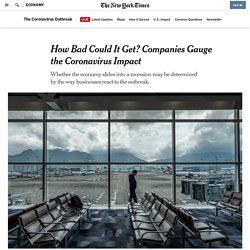
The announcements by businesses like Mastercard, Microsoft, Apple and United Airlines offer a reading on how the virus is affecting consumer behavior and business sentiment. These corporate bulletins — and what executives do in response — could determine how much economic damage the outbreak inflicts and whether a recession looms. Some companies have expressed optimism that governments will curb new infections and that consumer spending in Europe and North America will be largely unscathed. But if executives see a threat beyond the first three months of the year, they may pare planned investments and even start laying off workers.
That, in turn, would further dampen economic activity. The supply-chain problems have started to affect American homebuilders as well. Losing Jobs. About 120,000 film industry workers have already lost their jobs in Hollywood as a result of the coronavirus shutdown, according to the US entertainment industry union IATSE (International Alliance of Theatrical Stage Employees).
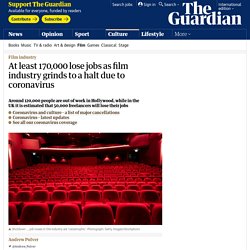
The estimate emerged in a newsletter sent out by the ICG (International Cinematographers Guild) to its members, which said: “The IATSE reports that the pandemic shutdown has resulted in the loss of 120,000 jobs held by its 150,000 members. It is critical that our industry be included in pending federal relief package.” The film and TV industry worldwide has experienced a near-total cessation of activity, with thousands of largely freelance crew laid off at short notice with little or no financial compensation. Scores of productions, ranging from studio shoots such as the Avatar sequels and Fantastic Beasts 3 to independent films such as Paul Schrader’s The Card Counter, have been halted. Border Shut downs. ‘Social recession’: how isolation can affect physical and mental health. As the Covid-19 pandemic continues, millions of people in the US are coming to terms with being increasingly cut off from society.
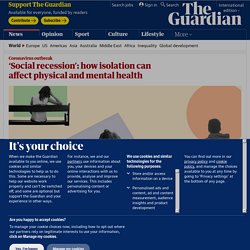
Beyond the inconvenience of working from home, or not being able to go to bars, restaurants or cinemas, however, experts have found that social isolation can have a profound effect on people’s physical, as well as mental health. Long-term, isolation even increases the risk of premature death. It’s being called a “social recession” to match any economic downturn also caused by the growing pandemic and it can have profound physical and psychological effects. “People who are more socially connected show less inflammation, conversely people who are more isolated and lonely show increased chronic inflammation. Chronic inflammation has been implicated in a variety of chronic diseases,” said Julianne Holt-Lunstad, a professor of psychology and neuroscience at Brigham Young University.
Food Hoarders - Causing Anxiety. 7 Ways to Cope with Stress in a Pandemic! - by Abizer Imran. Start Talking!! Dealing with it, the right way! Mental Health and Coping During COVID-19. The outbreak of coronavirus disease 2019 (COVID-19) may be stressful for people.
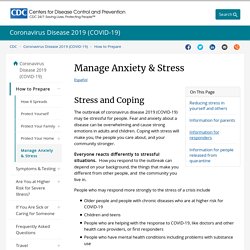
Fear and anxiety about a disease can be overwhelming and cause strong emotions in adults and children. Coping with stress will make you, the people you care about, and your community stronger. Everyone reacts differently to stressful situations. How you respond to the outbreak can depend on your background, the things that make you different from other people, and the community you live in. People who may respond more strongly to the stress of a crisis include. Coronavirus Anxiety: Coping with Stress, Fear & Uncertainty. Fears about COVID-19 can take an emotional toll, especially if you’re already living with an anxiety disorder.
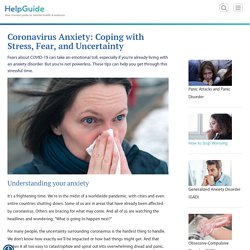
But you’re not powerless. These tips can help you get through this stressful time. Understanding your anxiety It’s a frightening time. We’re in the midst of a worldwide pandemic, with cities and even entire countries shutting down. For many people, the uncertainty surrounding coronavirus is the hardest thing to handle.